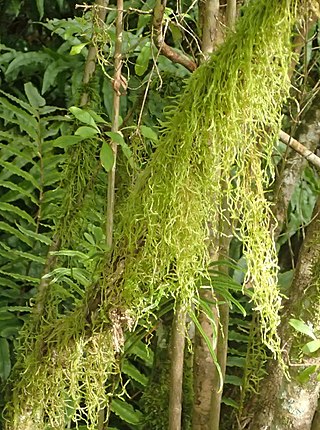Top Qs
Timeline
Chat
Perspective
Weymouthia (plant)
Genus of mosses From Wikipedia, the free encyclopedia
Remove ads
Weymouthia is a genus of two species belonging to the feather mosses. Weymouthia occurs in southern South America, New Zealand and south-eastern Australia and Lord Howe Island. It is characterised by (i) its monopodial, often hanging growth form; (ii) slight differences between stem and branch leaves; and (iii) the straight perichaetial leaves. In contrast to other genera in the Lembophyllaceae, secondary stems appear unable to arch back to the substrate and then root and form a new creeping stem.[1]
Remove ads
Etymology
Weymouthia was named in honour of William Anderson Weymouth (1842–1932), a prominent Tasmanian botanist.[1] The species epithet mollis meaning soft, flabby, weak or feeble in Latin, refers to the exclusively hanging branches in this species. The species epithet cochlearifolia refers to the spoon-shaped leaves that resemble those of scurvy-grass.
Taxonomy
Weymouthia has traditionally been assigned to the Meteoriaceae, mainly because of the hanging branches. Later the genus was included in the Lembophyllaceae,[1] but according to recent cladistic analyses based on DNA, this family is polyphyletic, and its revision is to be expected.[2]
Key to the species
Links to photos
References
Wikiwand - on
Seamless Wikipedia browsing. On steroids.
Remove ads

